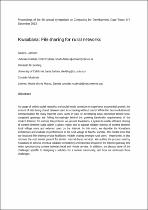JavaScript is disabled for your browser. Some features of this site may not work without it.
- ResearchSpace
- →
- Research Publications/Outputs
- →
- Conference Publications
- →
- View Item
| dc.contributor.author |
Johnson, DL

|
|
| dc.contributor.author |
Belding, EM

|
|
| dc.contributor.author |
Mudenda, C

|
|
| dc.date.accessioned | 2014-04-10T13:11:42Z | |
| dc.date.available | 2014-04-10T13:11:42Z | |
| dc.date.issued | 2013-12 | |
| dc.identifier.citation | Johnson, D.L, Belding, E.M and Mudenda, C. 2013. Kwaabana: File sharing for rural networks. In: Proceedings of the 4th annual symposium on Computing for Development, Cape Town, 6-7 December 2013 | en_US |
| dc.identifier.uri | http://www.cs.ucsb.edu/~ebelding/txt/dev13_kwaabana.pdf | |
| dc.identifier.uri | http://hdl.handle.net/10204/7333 | |
| dc.description | Proceedings of the 4th annual symposium on Computing for Development, Cape Town, 6-7 December 2013 | en_US |
| dc.description.abstract | As usage of online social networks and social media continues to experience exponential growth, the amount of data being shared between users is increasing without bound. While this has revolutionized communication for many Internet users, users in rural or developing areas connected behind slow, congested gateways are falling increasingly behind the growing bandwidth requirements of the modern Internet. To address this problem, we present Kwaabana, a system to enable efficient sharing of content between users within a given region and to support reliable sharing of content between local village users and external users on the Internet. In this work, we describe the Kwaabana architecture and evaluate its performance in the rural village of Macha, Zambia. The results show that our localized file sharing service facilitates reliable sharing amongst rural users. Importantly, it also removes the cost barrier present for similar Internet-based services. We outline the process used by Kwaabana to achieve eventual database consistency and minimize impact on the Internet gateway link when synchronizing content between local and remote servers. In addition, we discuss some of the challenges specific to designing a solution for a remote community, and how we addressed those challenges. | en_US |
| dc.language.iso | en | en_US |
| dc.publisher | ACM Digital Library | en_US |
| dc.relation.ispartofseries | Workflow;12424 | |
| dc.subject | Rural networks | en_US |
| dc.subject | Social networks | en_US |
| dc.subject | Traffic analysis | en_US |
| dc.subject | Localization | en_US |
| dc.subject | Kwaabana | en_US |
| dc.title | Kwaabana: File sharing for rural networks | en_US |
| dc.type | Conference Presentation | en_US |
| dc.identifier.apacitation | Johnson, D., Belding, E., & Mudenda, C. (2013). Kwaabana: File sharing for rural networks. ACM Digital Library. http://hdl.handle.net/10204/7333 | en_ZA |
| dc.identifier.chicagocitation | Johnson, DL, EM Belding, and C Mudenda. "Kwaabana: File sharing for rural networks." (2013): http://hdl.handle.net/10204/7333 | en_ZA |
| dc.identifier.vancouvercitation | Johnson D, Belding E, Mudenda C, Kwaabana: File sharing for rural networks; ACM Digital Library; 2013. http://hdl.handle.net/10204/7333 . | en_ZA |
| dc.identifier.ris | TY - Conference Presentation AU - Johnson, DL AU - Belding, EM AU - Mudenda, C AB - As usage of online social networks and social media continues to experience exponential growth, the amount of data being shared between users is increasing without bound. While this has revolutionized communication for many Internet users, users in rural or developing areas connected behind slow, congested gateways are falling increasingly behind the growing bandwidth requirements of the modern Internet. To address this problem, we present Kwaabana, a system to enable efficient sharing of content between users within a given region and to support reliable sharing of content between local village users and external users on the Internet. In this work, we describe the Kwaabana architecture and evaluate its performance in the rural village of Macha, Zambia. The results show that our localized file sharing service facilitates reliable sharing amongst rural users. Importantly, it also removes the cost barrier present for similar Internet-based services. We outline the process used by Kwaabana to achieve eventual database consistency and minimize impact on the Internet gateway link when synchronizing content between local and remote servers. In addition, we discuss some of the challenges specific to designing a solution for a remote community, and how we addressed those challenges. DA - 2013-12 DB - ResearchSpace DP - CSIR KW - Rural networks KW - Social networks KW - Traffic analysis KW - Localization KW - Kwaabana LK - https://researchspace.csir.co.za PY - 2013 T1 - Kwaabana: File sharing for rural networks TI - Kwaabana: File sharing for rural networks UR - http://hdl.handle.net/10204/7333 ER - | en_ZA |






